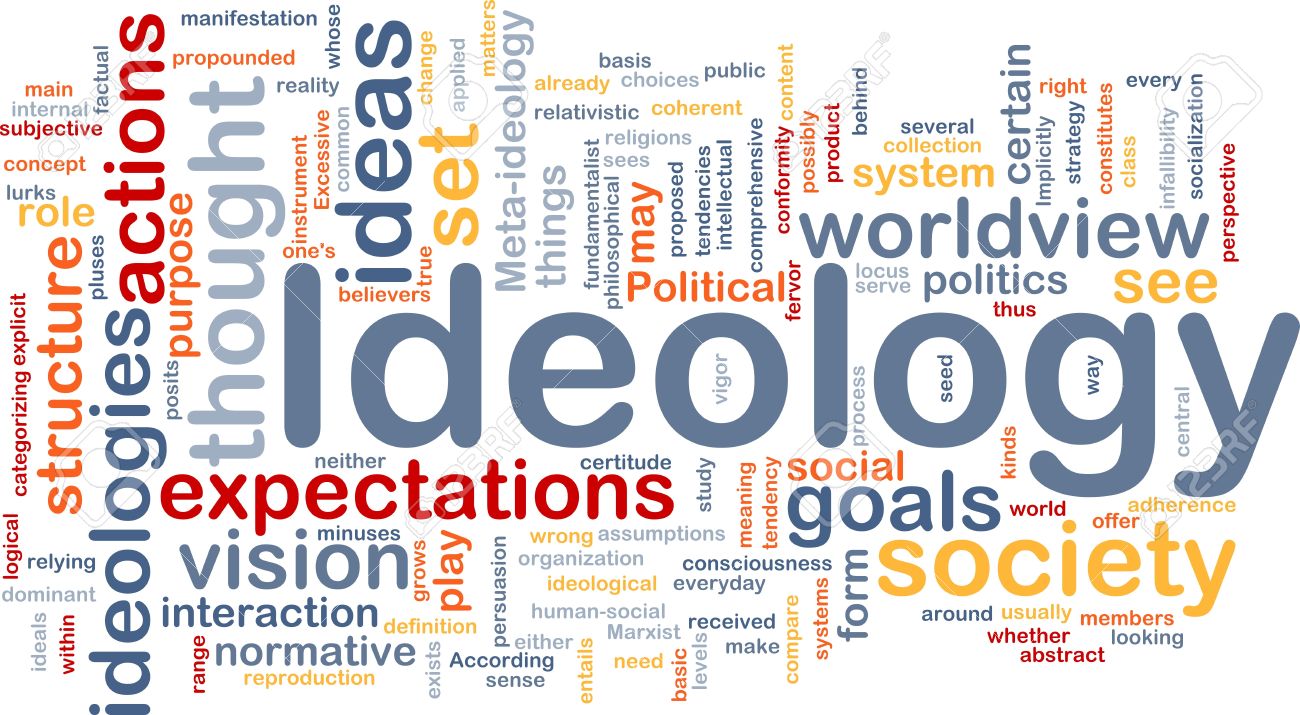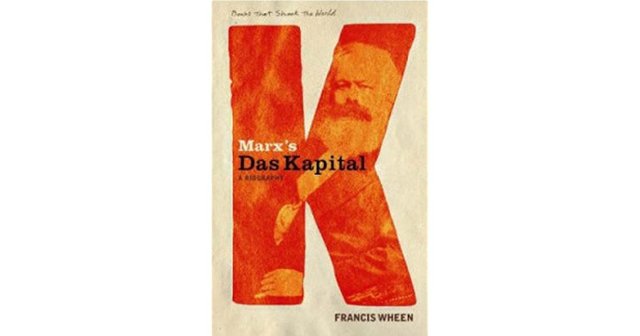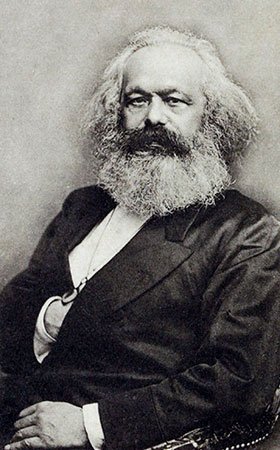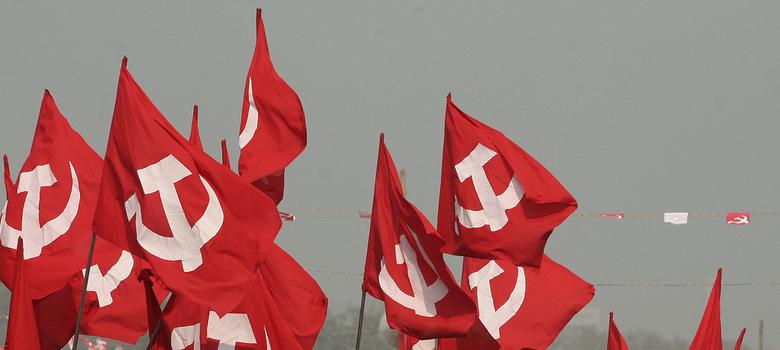150 years of ‘Das Kapital’, Karl Marx & Marxian Ideology :

*image source - Internet
The Marxism derives its name from that of Karl Marx, who is the chief exponent of this theory. He was the famous German economist and social philosopher of the 19th. Centaury. Marxism comprises a set of idea and practice about man and society that originated in the writings of Marx and Engels and later firmly developed by Lenin and Mao. But it is interesting to recall that this term “Marxism” was unknown in Marx’s own lifetime.
Another interesting fact is that four of Marx’s writings were written in collaboration with his comrade friend Friedrich Engels. After Marx’s death, Engels edited and published some of his works as Marx’s discipline and world view. Meanwhile, we may also put that they developed a scientific theory of the society, explaining how the present social order had come out, and how it would be transformed into a better one in the course of history. They made attempt to discover laws of historical changes, where they showed that social development was inevitable moving in the direction of social revolution which would ultimately lead to the establishment of a communist society.
This is also seen that Marx and Engels reject the liberal view that the state is a natural institution and that it exist to promote the well being of all the people. Rather, they hold that the state is a product of society at a certain stage of its development. It is a historical entity. It emerged out of the class division of the society and out of the need to hold the class antagonism in check. State has not been there in the primitive society, where the institutions of law, government and politics were totally absent.
Das Kapital & Marx :
‘Das Kapital’ was written in the middle of the 19th Century by German philosopher and economist Karl Marx, Das Kapital is essentially a description of how the capitalist system works and how, Marx claims, it will destroy itself. Before this, Marx had already set out his ideas on class struggle - how the workers of the world would seize power from the ruling elites - in the Communist Manifesto and other writings. Das Kapital is an attempt to give these ideas grounding in verifiable fact and scientific analysis. Here this is quite important to share that it is not an easy read. The product of 30 years of work, and Marx's study of the condition of workers in English factories at the height of the industrial revolution, it is part history, part economics and part sociology. Marx published the first volume of ‘Das Kapital’ in 1867, when he had settled in London with his family, and was being financially supported by his friend Friedrich Engels.
DAS KAPITAL *Image Source- Internet
Marx argues that commodities have both a use-value and an exchange-value, and that their exchange-value is rooted in how much labor-power went into them. While traditionally people bought commodities in order to use them, capitalists use commodities differently. Their final goal is increased profit. Therefore, they put out money and buy commodities, in order to sell those commodities for a profit. The cycle then repeats itself. The reason why the capitalists are able to make a profit is that they only need to pay workers their value (how much it takes to keep them functional), but the workers produce more than that amount in a day. Thus, the workers are exploited. The capitalists are able to do this because they have more power, and control the means of production. Furthermore, the workers' character is negatively affected by the system. They don't own the products of their labor, and the repetitive work they have to do make them little more than machines. His ideas of planned economies are terrible places to live. As a consumer, you have nearly no control over what products are available to you. You will always receive a worse product because the government won’t go out of business if it fails to displease you.
Finally, labour theory of economics. Marx states that workers’ wages should only be dictated by the amount of necessary labour that the worker puts in, rather than what the value of the products or services the labourer produces. So, if a neurosurgeon works for 8 hours, he or she will be compensated for the amount of labour they put in, and not based on the value of doing a surgical operation. This ties in to his earlier idea of equality.
Marx work ‘Das Kapital’ will be relevant as long as Capitalism exists, yes it was written some 150years ago but political economy hasn't changed much, the basic elements are still with us, Capitalism is a system of wealth accumulation through the production of profit. Everything might not be relatable to the struggle between two social classes, and history does not seem to be deterministic in the sense that Marx thought. But capitalist influence on policy making, and the loss of democratic power of the common man, could be seen as a struggle between the capitalists (bourgeoisie) and the workers (proletariat).
Marxism after Karl Marx:

V I Lenin addresses the crowd in Red Square in 1919 *Image Source- Internet
Communism, as stated by Karl Marx, was founded to assume power in Russia by Bolshevik Party. In 1916, V I Lenin, who was the firm follower of Karl Marx and his ideas, wrote a book titled “Imperialism, the final stage of Capitalism”, and started the Bolshevik Revolution, best known as Russian Revolution in 1917. But very soon it turned out to be autocratic. The political situation in Russia influenced by Lenin to modify the inadequacies of Marxian ideology to cope up with the changing circumstances without effecting any change in his fundamental philosophy. Lenin had also stated that, Marxian cannons are more theoretical and less practical. But as a discipline of Marx, he was successful in overthrowing Czarist regime from power in Russia. Later on, inspired by the Russian revolution, Mao-Tse-Tung created a Chinese or Asiatic form of Marxism. Mao was also convinced that unless the Marxian philosophy was interpreted to suit the conditions, the revolution could not be brought out in China.

KARL MARX *Image Source- Internet
Again, an Italian political thinker Antonio Gramsci, who devoted the Neo-Marxism ideas occupies the unique space in the realm of political thought. He gave new interpretation of the Marxist ideas. Gramsci viewed that ideological pre-dominance of the dominant classes in civil society can be adopted as a means to obtain subordinate groups and continue domination over the classes. There were also several political thinkers who advocated the Marxian ideology time to time. Ralph Miliband, Nicolous Powantaz, N. Bobbio are some of them
After the Soviet Union's collapstion in the early 1990s dealt a major blow to the credibility of Marxist theory and it went out of fashion on university campuses and in mainstream left-wing political parties that aspired to gain power in the West, such as the Labour Party. After the breakdown of Soviet Union, the critiques mostly point out that Marxism as a political theory lost its significance. By celebrating the victory of Liberalization and collapstion of Soviet Union, Francis Fukayama wrote on his work, “The End of the History and the Last Man” (1992) that there is no alternative to liberal democracy.
Again, it underwent something of a revival in the wake of the 2008 global financial crash, however, which some saw as a classic example of capitalism in crisis, just as Marx had predicted. After the breakdown of soviet Russia, the world turns into the uni-poller system, where USA is the hegemony. To compete with the US hegemony and liberal economic inequality a revolution is much needed. Therefore, Marxism is still relevant as alternative ideology capitalism- liberalism. It is also important to see that the revolutionary potential of Marx continues to inspire the people. The mechanism of rising expectations is being sought to be achieved through the method devised by Marx. Marxism remains the only the best alternative to liberalization. When liberalization could not fulfill the need of the people, they seek to interpret Marxism in their own way to suit their local milieu.
Marxism and India :
Marxism as a political ideology in India started its evolution since India’s struggle for Independence. There are many political parties which believes in Marxism and as well as in Communism. But they are least popular comparison to other political parties of India. Marxism as some social phenomenon or economic postulation is also still least popular. But, Marxism is still relevant not only in India, but in most of the under developed nations around the world.

FLAGS OF INDIAN COMMUNIST PARTY *Image Source- Internet
In Indian context, there are large numbers of people who still live in the conditions of extreme poverty, poor health and sanitation, illiteracy, caste oppression and economic exploitation. Most of the poor people are engaged as the labourer. There is also a huge gap between poor and rich as their economic stability. Hence, the economic and political exploitation still exists. In a very few lines, Marxism is still relevant, and keep returning as a popular movement as long as there is poverty, inequality, and exploitation. Not only in India, but in the rest of the world too.
If we consider CPI, CPI (M), CPI (ML) etc parties are the branches of Marxian ideology in India. Then we come out with this result that they are slowly and gradually loosing the faith from the people of India. Their performance in elections is gradually decreasing over the past few decades. The communist parties influence in South India and NE India is very less, except Kerala and Tripura. Now, all they have is Kerala, Tripura and West Bengal and their role in other states is very limited. The core reasons for the Communist Parties decline in India as per my own opinion are following:
(1) They did not adopt the change according to the change circumstances.
(2) They did not invite new leadership or they are less popular among the youths & unconscious voter’s comparison to others.
(3) Lack of unity between communists itself, which resulted many splited among the left parties.
(4) They have the less numbers of big faces as political influencer, who is much popular among the people of India. Most of the people do not know the names of left political party’s leaders except the few one.
(5) Their way of doing politics is not much popular in these recent times.
(6) They even fail to raise the issues associated with its people on the larger scale.
(7) They are always centralized towards the poor and working class but the class even do not aware with the Marxian Ideology or they fail to spread their ideology along with the working class or the poor people.
So, these things do not indicate a bright future of Marxism in India. To come up with these problems they should first introspect and think for the better tomorrow.
.jpg)
Aam Aadmi Party *Image Source- Internet
In a few years back, the Aam Aadmi Party’s (AAP) broom came in the action in Delhi election. It was the bigger from the expectation for any infant political party. They, AAP party resulted that why you never prescribed any dream without any clear vision to make sure. And yes, somewhere AAP has changed the style of political processes in India. This is also a good sign for the democracy and as well as who follows or believes in Marxism. Because, those who voted for AAP , most of them are common people or the working section of the people and AAP also fought the election becoming the voice of common people’s common problems. So we may say that, uprising of AAP in Indian politics brings a new ray of hope for the Indian left parties. But they will have to improve themselves and fit in the political scenario.
Conclusion:
Marx was a revolutionary and socialist, but above all he was a humanist who believed in genuine emancipation and liberation of human beings. He registered protest against every kind of domination. Therefore, on this article a non-Marxist is showing the gratitude to Karl Marx and his visionary ideas or thoughts.
The problems faced by the Marxian ideology or Communism is the serious threat for Marxist. Francis Fukayama wrote on his work, “The End of the History and the Last Man” (1992) that there is no alternative to liberal democracy, but reality reveals that Marxism continues to inspire millions who feel that they are cheated by capitalistic enterprises and its ethos. Despite of all the criticism, its scientific rigour in tracing the origin and evolution of states is noteworthy for social scientist. Its optimist vision of classless society continues to inspire millions of people. As such, Marxism is bound to bounce back the moment rises of capitalism become evident.
This post recieved an upvote from minnowpond. If you would like to recieve upvotes from minnowpond on all your posts, simply FOLLOW @minnowpond
thnq.. i have already followed u
This post recieved an upvote from minnowpond. If you would like to recieve upvotes from minnowpond on all your posts, simply FOLLOW @minnowpond
I like your post. It gives a good overview of the origins of marxism and takes an objective approach. I am definitely not a marxist, but it was an interesting read. I am in favor of social initiatives as long as they are voluntary. This is where all communist regimes have failed since states by definition claim a monopoly on the initiation of violence.
thanx for your valuable inputs ... this article is itself a gratitude showing by a non-marxist towards the marxism. hope you will also upvote on this & follow me ! I'm following you from India!
Excellent post thanks imbsnt! I wish more people understood that the Marzist ideology that they have here in America is the problem, not our Republic.
thnk you for your valuable inputs
I've got to restem this. It's that good!
Um..can't resteem. Maybe I don't have enough power?
The real problem with ideologies is that they never take into account he character, motives, wisdom and capability of the leaders which in the final analysis, actually determines the true outcome for the people regardless of what particular ideology is adhered to. Greedy, stupid, inhuman and incompetent leadership will bring down any government.
ya,,,, agree with ur sentences
Exactly! But for some reason the Left seems to be totally ignorant to that fact. They believed for example that Obama was some great savior or something that was going to take car of them. They gave him so much power. They didn't/don't care about States rights. They think that giving the Federal government State's rights & powers is ok because Obama is trustworthy...ugh The Right knows better. We don't want Trump to have any more power than any president should have. It's a constant battle here in America between Left/Right because of that. And exactly why Trump won. We judge him (and love him) becsuse of how much power he'll give BACK to the States. And so far so good. It has the Left in an uproar because thry see their gravy train dwindling. But the Federal government is not SUPPOSED to be a gravy train!!!